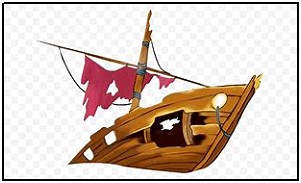Shipwrecks: Diving into History
Hybrid – 3:10 pm – 4:50 pm
March 11, 18, 25, April 1, 8, 15
Come sail with us through time as we explore twelve noteworthy shipwrecks that serve as underwater time capsules. We explore the fascinating world of maritime archaeology, using sunken vessels as windows into the past. Drawing inspiration from Fernand Braudel’s insight that “the sea is the greatest document of its past existence,” we examine how shipwrecks provide unique snapshots of historical periods, offering valuable context to broader historical narratives.
- Week 1: The Bronze Age
- The Dover Ship (c. 1550 BCE – British ship pre-Roman occupation)
- The Uluburun (c. 1330-1300 BCE – Egyptian Ship)
- Week 2: The Greeks and the Romans
- The Tektas (c. 447-438 BCE – Greek ship)
- The Plemmirio (c. 200 – Roman ship)
- Week 3: China and the Middle East
- The Church Ship (c. 6th century – Byzantine ship)
- The Belitung (c. 826 -Arab Ship)
- Week 4: The Vikings and the Tudors
- The Roskilde (c. 1025 – Viking Ship)
- The Mary Rose (c. 1545 – English ship)
- Week 5: The Dutch and Italians, plus The Golden Age of Piracy
- The Santo Cristo di Castello (c. 1667 – Geonese ship)
- The Royal Anne Galley (c. 1709 – British ship)
- Week 6: Polar Exploration and World War II
- HMS Terror (c. 1813 – British ship)
- SS Gairsoppa (c. 1919 – British ship)
Elissa Kaplan earned a BA in German Language and Literature at Valdosta State College, an MA in Comparative Literature at the University of Colorado, an MEd at the University of North Carolina and a EdD in Educational Leadership from The George Washington University. She has served as Director of Education at four synagogues in Maryland and Connecticut, and she is the immediate Past President of The Jewish Historical Society of Fairfield County. She is the founder and director of Growing Projects, an educational consulting company, whose vision is “leadership through critical thinking and compassionate choices.”


